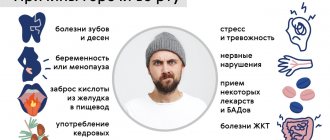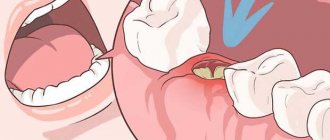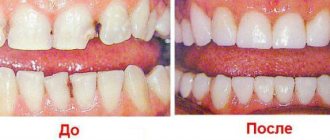A foreign taste in the mouth not only causes discomfort and prevents you from enjoying your favorite food, but also often indicates health problems.
The occurrence of a metallic taste in the mouth is familiar to a large number of people: this sensation is not the most pleasant, but not all of those who have encountered it try to find out its cause. There is nothing wrong with if the iron taste in the mouth appears once, but if it occurs periodically, then the reasons for this phenomenon should be found out.
Quite often you can hear complaints about a metallic taste in the mouth: why does it appear and how to get rid of it?
The reasons that cause an iron taste in the mouth can be very different: when faced with this symptom, you need to try to determine how often it occurs, and whether it is accompanied by any other signs.
First of all, it is worth clarifying what a metallic taste in the mouth is: it is unlikely to confuse this phenomenon with anything else, since it is a pronounced bitter taste with sour notes - a fairly accurate understanding of this taste can be obtained by touching the battery with your tongue . Often the appearance of such a taste is accompanied by an astringent sensation in the mouth and tingling of the tongue (partial numbness is also possible).
Metal taste as a symptom of oral diseases
Patients with gum problems often complain of a strong metallic taste that occurs repeatedly throughout the day. The most popular diseases that provoke such unpleasant sensations include periodontitis and gingivitis, which are accompanied by bleeding gums, and many people describe the taste of blood as metallic. It usually appears during brushing your teeth and after eating. Some patients feel as if there is a foreign body in the mouth, which causes serious inconvenience.
Loose teeth and tartar build-up can also cause a metallic taste. There is no point in trying to independently identify the causes - it is better to immediately contact a dentist.
Metal
The reason may be unhealthy teeth or gums.
A metallic taste in the mouth can be caused by metal crowns or fragments of dentures. In this case, you should discuss with your dentist the issue of replacing them. When making a diagnosis, exclude:
- diseases of the periodontium and maxillofacial system with obvious signs of a purulent process;
- bleeding from the gums;
- poisoning with salts of heavy metals - such taste sensations are caused by mercury, zinc, arsenic, copper;
- diabetes mellitus in the stage of decompensation with a slight change in blood sugar levels;
- Iron-deficiency anemia;
- chronic bleeding due to stomach ulcers;
- hormonal disorders;
- taking certain medications. The appearance of such sensations is facilitated by drugs from the NSAID group and anticonvulsants. When the drug is discontinued, the metallic taste disappears on its own.
Why there is an iron taste in the mouth: reasons not related to disease
If you notice an iron taste in your mouth, you should not immediately panic: there is a possibility that the unpleasant sensation is not associated with diseases.
It may appear due to:
- drinking mineral water with salts (often this product is enriched to compensate for iron deficiency in the body);
- drinking low quality drinking water (for example, supplied to the home through old rusty pipes);
- tongue piercing (the sensation appears as a result of the metal reacting with certain foods);
- using cast iron and aluminum cookware when preparing and eating food.
Sour taste in pregnant women
The appearance of such an unpleasant aftertaste in a pregnant woman is facilitated by 2 metabolic processes associated with the process of bearing offspring.
You can thank for the acid in your mouth:
- The hormone progesterone. This is a necessary condition for pregnancy. This substance helps relax muscle tissue, preventing the development of fetal rejection. Ideally, it should act only on the muscles of the uterus. But in reality, all smooth muscles relax, including the muscles of the stomach and esophagus.
- The growing uterus puts pressure on the hollow organs. There is a reflux of stomach contents into the esophagus and oral cavity. The result is heartburn and an acidic taste in the mouth.
In this case, taking an antacid is indicated at the discretion of the gynecologist. But first you should exclude diseases of the gastrointestinal tract. The drug of choice can be Gaviscon in any convenient form.
Medical causes of metallic taste
If a metallic taste appears in the mouth, this may indicate illness. Their list is very extensive. To make it easier to classify, diseases can be divided into two groups: dental and non-dental.
Diseases that lead to a metallic taste, which are systemic in nature and are not associated with teeth and gums, are as follows:
- diseases of the ENT organs (sinusitis, otitis, laryngitis, etc.);
- lung diseases (pneumonia, tuberculosis);
- diseases of the gastrointestinal tract (gastritis, cholecystitis);
- diseases affecting the nervous system (sclerosis, tissue tumors);
- anemia due to deficiency of iron or B vitamins.
It is not uncommon for a metallic taste to accompany diseases that develop in the oral cavity. These include:
- stomatitis (the mucous membrane of the oral cavity becomes inflamed, which is often accompanied by the formation of small ulcers);
- gingivitis (inflammation of the gums);
- periodontitis (the disease appears as a result of advanced gingivitis, when the infection no longer affects the external tissues, but the periodontium);
- glossitis (formation of plaque on the tongue, its inflammation).
Another common cause of taste associated with the oral cavity and dentistry is the installation of crowns and dentures. The appearance of a taste in this case is normal, provided that it goes away within 1-2 months. A sign that adaptation to the structure in the mouth has not occurred is unpleasant sensations in the form of tingling of the tongue, burning, and a feeling of dryness.
What to do and who to contact?
A therapist will help you deal with this problem.
How he will do it:
- Recognizes patient complaints and symptoms. Ask questions about nutrition, sleep patterns, and oral hygiene. Will conduct an inspection.
- Prescribe the necessary blood and urine tests. Thus, it will find out which vitamins are missing, and whether there are any diseases that contribute to unpleasant taste sensations.
- Based on test results and symptoms, he will prescribe medications. Will tell you detailed steps and solutions for bad taste in mouth.
If the test results show that there are infectious or viral diseases in the body, the doctor is obliged to redirect you to a specialized medical specialist.
Remember! If there is any deviation of your immune system from the norm, you should consult a doctor. Only they can prescribe the correct and necessary treatment to solve problems. And our article will help you find out the possible reasons and not panic until a specialist’s verdict.
Add AN to your sources so as not to miss important events - Yandex News
Become a member of the CLAN and every Tuesday you will receive the latest issue of “Arguments of the Week” with a discount of more than 70%, along with exclusive materials not included in the newspaper. Get premium access to a library of the most interesting and popular books, as well as an archive of more than 700 published issues for FREE. In addition, you will have the opportunity to benefit from free legal advice from our experts for a whole year.
- Enter your email address, then select any convenient payment method for your annual subscription
- Scan the QR. In the Sberbank Online application that opens, enter the annual subscription cost (490 rubles). Then send the confirmation code by email
Or
How to identify the cause of a metallic taste in the mouth
Only a doctor can identify the correct medical causes and figure out why a metallic taste appears in the mouth after conducting appropriate studies and tests, so you should not hesitate to visit medical specialists.
Measures to identify the cause of unpleasant sensation in the mouth:
- biochemical and clinical blood tests to determine the level of various substances in the body (for example, if hemoglobin is low, this may indicate the development of anemia, a high creatinine level indicates kidney disease);
- a detailed dental examination, during which the general condition of the teeth and gums is determined;
- hormone level test;
- X-ray (used both in case of suspected diseases of the gastrointestinal tract and in the dental field);
- MRI, gastroscopy and various other methods depending on the type of disease detected.
Acid and bitterness
A bitter taste indicates a disruption of the liver and bile ducts. It may appear occasionally, but may bother you regularly.
Possible causes of a bitter-sour aftertaste:
- significant errors in nutrition - the liver is simply not able to cope with so many fatty, heavy, spicy foods, alcoholic drinks;
- alcoholism - the liver suffers first;
- treatment with aggressive drugs - a long course of antibiotics, antihistamines, and other medications;
- those who like to smoke a cigarette at night.
If we consider bitterness in the oral cavity in terms of the intended diagnosis, then most often it is cholecystopancreatitis, erosion of the mucous membranes of the stomach and intestines, gastritis.
Metal structures in the mouth
After installing braces and crowns, dentists warn patients about the possible appearance of a metallic taste - this is a normal phenomenon that should subside within a week after the procedure. If this period has passed, and discomfort still makes itself felt, the reasons may be as follows:
- allergy to metal. It is very rare, but taking an allergy test will not be superfluous. If the suspicion is confirmed, the only solution will be a complete replacement of all installed structures;
- galvanism (interaction between metals), which occurs in the case of installation of orthopedic structures made of different materials that interact with each other. If all the crowns and posts are made of the same material and the amalgam fillings are replaced, the problem will disappear.
If you have metal dentures or implants, an iron taste may become noticeable after consuming acidic foods and drinks. Accordingly, the presence of piercings on the tongue or lips can also cause a similar effect.
How to get rid of the problem
If the cause of this is not a symptom of a disease, or a change in physiological state, you can try to eliminate the problem by rinsing with a salt solution (a teaspoon per half liter of water), drinking fruit and vegetable juices. You can chew propolis, ginger root, fresh mint leaves, and add dried spices to drinks.
Brushing your teeth after every meal, using rinses, dental floss for additional cleaning of interdental spaces, brushing your tongue with a special brush - all these measures will help get rid of the unpleasant taste in your mouth. Timely installation and replacement of dentures and dental sanitation can solve the problem.
Metallic taste in the mouth of people of different sexes
A number of reasons that cause the sensation of metal are divided by gender.
For men who work in mining or in industries that use heavy metals, an iron taste may appear during each shift and disappear after the end of the shift. Long-term wearing of massive metal objects (bracelets, watches) also leads to a similar result, since during prolonged contact with the skin the concentration of ions entering the blood through the pores becomes too high.
Women may experience a metallic taste due to:
- pregnancy. Many expectant mothers note that a metallic taste periodically appears during pregnancy. Why does this happen? Firstly, the matter may be a lack of microelements and vitamins, and secondly, changes in hormonal levels and malfunctions in the functioning of receptors that recognize taste can be to blame;
- the use of weight loss drugs and various biological additives, which often leads to poisoning due to incorrect dosages and the desire to quickly get the most pronounced result possible;
- insufficient amount of fluid consumed (women resort to this remedy to lose weight and get rid of swelling). A metallic taste is one of the signs of dehydration.
It is best to start combating this not very pleasant feeling by visiting a doctor who will prescribe the necessary tests and examinations. Otherwise, you can look for reasons on your own and continue to experience discomfort regularly for a very long time.
Symptoms of respiratory diseases
Sweet breath is a symptom of what disease?
If someone says that your breath smells like honey, perhaps this compliment will be the most precious to you because it will save your life. Sweet or fruity breath, as well as the smell of acetone or some kind of chemical substance on the breath (like nail polish remover) serves as a serious warning sign of a dangerous disease - diabetes, that blood sugar levels are not normal. In medical language, this condition, which requires immediate attention, is called diabetic acidosis or diabetic ketoacytosis. If blood sugar levels are not adjusted immediately, coma may occur, followed by death.
Garlic breath is a symptom of what disease?
Does your mouth smell like garlic even if you haven't eaten it for a long time? This could then be a sign of selenium poisoning (selenosis). Although selenium is an important antioxidant, it does not need to be taken in large doses. In addition to dietary supplements, selenium is found in nuts (especially Brazil nuts), meat, seafood and - not surprisingly - garlic. But in order to “eat enough” before selenosis appears, you need to eat a lot of garlic or other foods rich in selenium.
Approximately 40 million Americans suffer from bad breath. Discoloration of teeth and enamel, skin discoloration, hair loss, nail problems, apathy and irritability are some other signs of an excess of selenium in the body. Selenosis can lead to neurological impairment and, in extreme cases, lung disease, liver cirrhosis, and even death.
In extremely rare cases, garlic breath is a sign of arsenic poisoning, especially if accompanied by a metallic taste. This condition requires immediate medical attention.
Breath that smells like urine is a symptom of what disease?
Urine-smelling breath is difficult to ignore, at least among those close to you. Here we are talking about one of the main signs of kidney disease or even life-threatening kidney failure. Since people with diabetes and high blood pressure are at risk for kidney disease, they should take this, albeit unpleasant, warning with great attention.
Fishy breath is a symptom of what disease?
Have you ever had a conversation with a work colleague whose breath smells like fish? This smell may be a clear sign that your employee is taking too many fish oil supplements to replenish their body's supply of Omega-3 fatty acids. But in more serious cases, this phenomenon indicates renal failure.
Fecal breathing is a symptom of what disease?
Don't rush to punch someone in the face who says your breath smells like... feces. Symptoms of such breathing may be associated with dysfunction of the digestive tract. For example, with gastroesophageal (gastroesophageal) reflux (acid reflux) - a condition in which the stomach throws gastric juice into the esophagus. Fecal breathing is sometimes a symptom of an illness, a disorder with the frightening name of intestinal perforation, which is considered a fairly common disease. With it, the inner surface of the intestine becomes too porous. Therefore, according to doctors, toxins and undigested food enter the bloodstream, and this provokes the appearance of food allergies and autoimmune diseases.
Among other things, fecal breathing can be a symptom of intestinal obstruction (and this condition requires immediate medical attention!) or constant bouts of vomiting with bulimia. And like any form of halitosis, the appearance of fecal odor from the mouth often signals serious respiratory or pulmonary problems.
Interesting facts about breathing
In the Talmud, the Hebrew scripture, bad breath was considered a serious vice. Priests with halitosis were not allowed to conduct services. A partner's bad breath could even be grounds for divorce. By the way, this law is in effect in Israel to this day.
The ancient Greek physician Hippocrates could not stand women with bad breath. To keep their breath fresh, he gave the following recommendations to all girls: burn the head of a hare and, separately, three mice, mix the ashes with powdered marble and apply to the teeth and gums, then rinse their mouths with a tincture of dill, anise and myrtle seeds in white wine.
A salty or fishy taste in the mouth is a fairly common problem. Although this is not a dangerous disease, the off-taste can cause some discomfort and interfere with the enjoyment of food and drinks.
Treatment
Relieving a specific taste consists of eliminating the factor or disease that provoked it.
Dacryocystitis is eliminated with:
- hormonal agents in the form of drops (Betamethasone, Hydrocortisone);
- anti-inflammatory medications (Ketanova, Ketorola);
- antibiotics (Penicillin, Aminoglycoside).
Sinusitis is treated with anti-inflammatory and painkillers (Daleron, Aspirin, Erespal). Sometimes antibiotic therapy (Amoxil, Cefaclor, Abiflox) may be necessary.
Drug treatment of sialadenitis consists of prescribing:
- anti-inflammatory drugs (Ketanov, Nimesil);
- antispasmodics (Drotaverine);
- analgesics (Analgin, Pyramidon).
In case of dehydration, it is necessary to establish a drinking regime.
Caries, gingivitis, periodontitis require sanitation of the oral cavity.
Treatment of hormonal and brain disorders is usually complex and selected individually.











